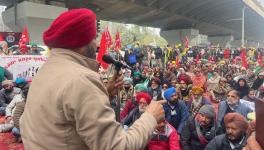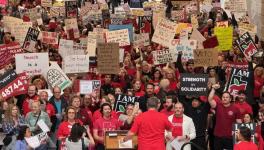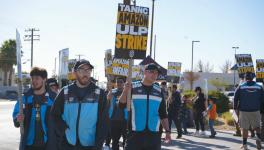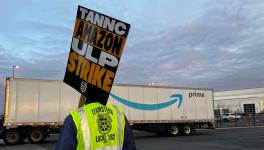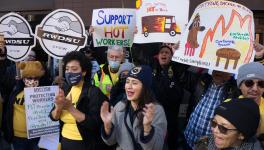Counting Underway for Historic Union Vote at Alabama’s Amazon Unit
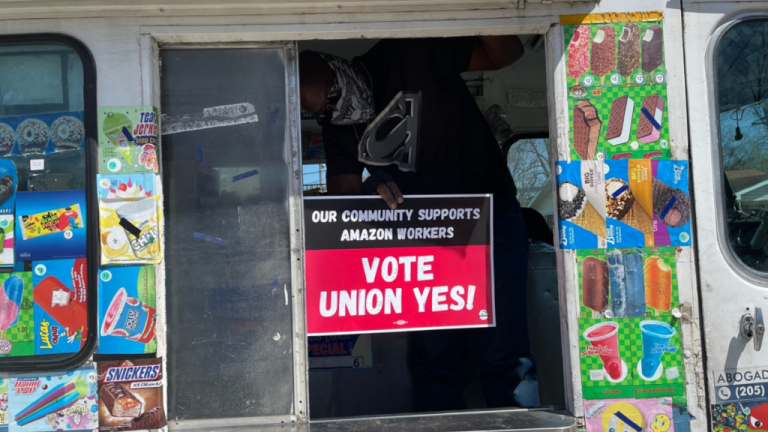
Locals and residents of Bessemer came out in support of the unionization drive by Amazon workers on March 20. Photo: Liberation
After more than seven weeks of ballot submissions, the workers at Amazon’s Bessemer warehouse in Alabama submitted their final votes on Monday, March 29, to decide whether or not they want a union. On Tuesday, March 30, the National Labor Relations Board (NLRB) began the count of over 5,800 ballots, the results of which could take the next couple of days to be released.
The unionization drive has grabbed national limelight over the past two months, not only because of the historical nature of the vote and the impact it could have on union organizing across the country, but also because it revealed the abysmal work culture at one of the United States’ largest employers. At the same time, the campaign unlike previous campaigns for unionizing Amazon workers managed to attract nationwide solidarity and support.
The local unit of the Retail, Wholesale and Department Store Union (RWDSU) has been at the helm of the unionization campaign since at least the latter half of 2020, despite the challenges put up by the company. The campaign reportedly began just months after the warehouse at Bessemer, called BHM1, was opened in 2020 due to rising demand during the COVID-19 pandemic.
Multiple strikes actions by fast food and delivery workers across the country, during the first wave of the pandemic, followed by nationwide anti-racism protests that also hit the city of Birmingham of which Bessemer is a suburb, inspired workers to take action. According to the RWDSU, close to 85 percent of the workers are black in the warehouse, most of whom come from Bessemer and other Birmingham suburbs.
By November 2020, the campaign was able to garner over 3,000 signatures or more than half the workers at BHM1 for the petition stating an interest for a union vote to the NLRB. If the results of the vote comes out in favor of the union, Amazon will not only have to recognize a collective bargaining mechanism at one of its largest warehouses in the country, but also deal with a domino effect in its other plants as well.
Darryl Richardson, a worker at the warehouse and who first reportedly contacted the RWDSU, has already stated that the organizers of the unionization drive have been contacted by over 1,000 Amazon workers from 50 different warehouses across the country. In the meanwhile unions like International Brotherhood of Teamsters (IBT) reported last month of receiving hundreds of members from Amazon warehouses in Grimes and Iowa City in the state of Iowa, and shall be pushing for unionization.
This was evident in the months of anti-union campaign, ads and PR campaign that Amazon has unleashed against the workers. In January, workers reported being made to sit through anti-union presentations and receiving flurry text messages against collective bargaining and union dues. That same month the company campaigned with the NLRB against accessible means of submitting their votes, like postal ballots, and at the same time, reportedly spent close to USD 10,000 per day for a union-busting consultancy.
Later, as the voting was underway the union it was also reported that Amazon manipulated traffic lights which affected pro-union canvassing and also targeted younger undecided workers with advertisement and other union-busting mechanisms with RWDSU organizers described to be “severe”.
The worst flurry of PR work from Amazon was witnessed after reports came out earlier this month in which workers shared extreme measures they had to take while on the job. Several news outlets reported workers anonymously admitting that practices such as urinating in bottles, which has been reported since at least 2018, were widespread due to work targets, which requires one to do a task every six to nine seconds, and the lack of access to toilets.
While Amazon released statements denying these reports, according to internal documents released to the media, the company was well aware of such practices and scores of other “behavioral violations”. The documents show that not only was Amazon aware, it reprimanded workers for such behavior, while suggesting nothing to alter the work culture.
In response to these revelations, Amazon took to not only denying the allegations but has also deployed an army of social media accounts, purportedly of its workers, to respond to criticisms or negative press about the company. Many have noticed that these accounts seem to have been suspiciously active since March this year and only largely tweet about the company.
The company also got into spats with Democratic Party leaders, including senators Bernie Sanders and Elizabeth Warren, and congresspersons Alexandria Ocasio-Cortez and Mark Pocan, who have all publicly condemned the workplace culture of the trillion dollar corporation.
Despite the onslaught of attacks by Amazon, the workers are hopeful of making a difference with the vote and have received significant support from workers and activists around the country. The support it has garnered only indicates how the movement continues to influence political discourse on workers’ rights.
On March 20, community members of Bessemer, along with RWDSU, held a solidarity rally with residents coming out in large numbers for the union. The rally was also joined by activists of the Party for Socialism and Liberation from Alabama, Georgia and Florida.
Other similar solidarity drives were held in different parts of the country, including other southern states with anti-union political climates. The situation has also pushed mainstream politicians, not particularly known for being pro-union, across the spectrum, from president Joe Biden to Marco Rubio to come out in support.
Courtesy: Peoples Dispatch
Get the latest reports & analysis with people's perspective on Protests, movements & deep analytical videos, discussions of the current affairs in your Telegram app. Subscribe to NewsClick's Telegram channel & get Real-Time updates on stories, as they get published on our website.









